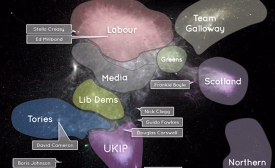data analysis
Mobile apps for social good used to be trendy, but international aid organizations need to think harder about how they can use the data they collect, says one senior program manager at the U.S. Agency for International Development. [...] Mobile technology is most useful when the data it produces lets aid groups send resources to the exact place they're needed
In an earlier CPD blog post, Sohaela Amiri’s list of essential tools for digital diplomats concluded: “Impactful social media presence is primarily about listening.” We agree. Our recently published research, moreover, outlines some ways that the ease of search, categorization, and analysis of digital media content can be put to use to learn more about how nations are represented in online media.
The increasing availability of data is pushing the boundaries of what was once imagined possible in public diplomacy. Data science has the potential to draw large data sets into the study and practice of diplomacy, and allow diplomats and scholars to become comfortable engaging with and analyzing increasingly large and often unstructured data.

Ali Fisher on the diplomatic potential of campaign-related tweets.
There has never been a better time for diplomats to get into data and push the boundaries of what is imagined to be possible within public diplomacy. The amount of data available is greater than ever, perhaps 90% of which was generated in the last two years. At the same time, more people globally are communicating in ways that generate data which is publicly observable, for example through the API of social media platforms. Equally, the tools to analyse data have expanded rapidly, allowing users to search large amounts of data quickly and efficiently.







